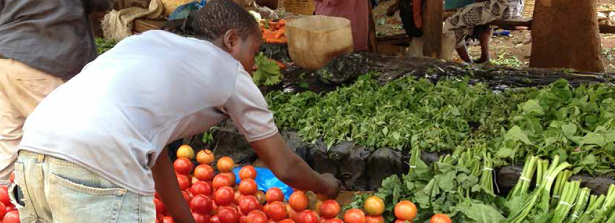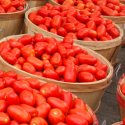How does the Fruit and Vegetable Sector in low- and middle-income countries contribute to Food and Nutrition Security?

Following the initial idea of the Topsector Horticulture and Starting Materials, an explorative study has been conducted by LEI Wageningen UR within the Food & Business Knowledge Platform (F&BKP) on the potential of the Fruits & Vegetables Sector for Food and Nutrition Security. Although there are many initiatives and programmes to support the horticultural sector in Africa, among which several key programmes of Netherlands Embassies, this study is among the first endeavours to explore the relationship with food and nutrition security. Please find below the link for the full report and study summary titled, “How does the Fruit and Vegetable Sector contribute to Food and Nutrition Security?”
Background
This short and explorative study focused on the question of whether and to what extent investments, interventions and the development of the Fruits & Vegetables Sector in developing countries contribute to enhanced food and nutrition security. A focused literature review concentrated on evidence primarily, but not exclusively, derived from the Fruits & Vegetables Sector in the following countries: Ethiopia, Rwanda, Ghana, Uganda, Kenya, Indonesia and Viet Nam. The study methodology also included a series of semi-structured interviews amongst different growers, traders and workers in the Ethiopian fruit and vegetable sector.
The main findings and interim conclusions were discussed with a group of specialists from the private sector, academia, civil society and government in March 2015.
Key findings
The development of the Fruits & Vegetables Sector in developing countries has a positive impact on the Food and Nutrition Security of the people engaged in the sector and for urban and rural consumers. Farmers who produce fruit and vegetables are increasing their income, especially compared to grains and other staple food crops. The sector also provides many job opportunities for male and female workers. Increased levels of income have widely improved access to fruit and vegetables for African consumers, although overall consumption levels of fresh fruit and vegetable are still below the daily intake levels recommended by FAO and WHO. Households with fruit and vegetable cultivation appear to have less nutrition-related health problems such as vitamin and micronutrient deficiencies, which was particularly noticeable amongst women. There is evidence that vegetable producers are better integrated into markets contributing to a more stable market position.
The traditional small-scale fruit and vegetable production and marketing sector are important sectors in terms of employment, income and scale of production. More development opportunities exist for growers when they linkup with upcoming small and medium-sized enterprises in the African agri-food sector that invest in logistics, wholesale, warehousing, cold storage, processing, local fast food and retail. An important trend is the upcoming supermarket sector in Asia and Sub-Saharan Africa. Surveys in Kenya and Indonesia showed that fruit and vegetable growers who participated in the higher value supply chain arrangements for the domestic and regional markets received a higher income.
Furthermore, the fruit and vegetable sector compares favourably with cereals and other food crop sectors in terms of employment and income generation. The production of vegetables has a comparative advantage particularly under conditions where arable land is scarce and labour is abundant. Vegetables have a lower comparative advantage when labour and access to inputs are limiting factors.
Knowledge agenda
Given the clear demand and interest from many stakeholders from practice to policy in the Fruits & Vegetables Sector (including businesses, civil society, government and academia), and the fact that the Netherlands has added value and could make a difference within the sector, the Food & Business Knowledge Platform initiated this explorative work. It is very clear from the process and study results that understanding this topic could further generate innovations of different kinds and help create impact at the system level.
The study research team observed that academic literature and project documents provide relevant information on the production of fruits and vegetables and on labour opportunities in this sector. Conversely, they found it is more difficult to find information on food security effects of bigger investments in the Fruits & Vegetables Sector by amongst others Dutch actors. This result is due to evaluative information not often being available given the stage many of these programmes are in. There was also a limitation in finding material about the potential of the fruit and vegetable sector for nutrition security.
The research team and the above-mentioned expert meeting in March 2015 generated a number of areas for a further knowledge agenda. These have been compiled in a draft note that is available here.
The Food & Business Knowledge Platform will be a space for further knowledge sharing about (selected elements of) this agenda, and together with stakeholders who have indicated their interest. If your company or organization is interested in being a part of the further conversation on this topic, or would like to be a co-organizer of meetings, learning trajectories, or further exchanges, please contact the Office of the Platform at .






